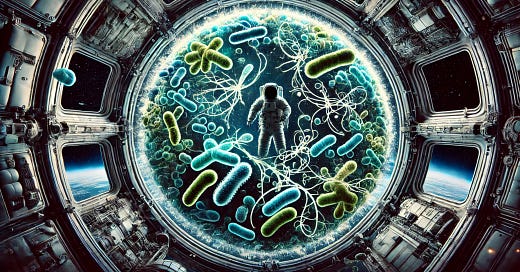A lack of bugs in space might be making astronauts sick
Dear Readers,
This week, I'm sharing some fascinating research that completely inverts how we should think about microbes in space, with some important thoughts on planning for future long-term missions.
But first, an obligatory plug for my other free non-science newsletter:
Growing up, I read stories and watched sci-fi in which alien microbes infected astronauts and threatened Earth.
Yet we haven't discovered any non-Earth life, and the microbes in space are simply the ones we've taken there.
A very cool new paper captures an interesting inversion: in the harsh environment of space, it is not the fear of deadly alien microbes we need to worry about, but rather the absence of beneficial microbes that we find on Earth.
UC San Diego researchers analyzed 803 samples from the International Space Station and found it's essentially a bubble lacking many of the microbes from the environment our bodies evolved with. Their analysis showed the ISS environment most closely resembles a COVID isolation dormitory on Earth in terms of the paucity of microbes.
Although no one knows for sure yet, it’s plausible that this lack of beneficial microbes contributes to immune dysfunction, skin conditions, and reactivation of dormant viruses astronauts face in space.
This makes sense. Our immune systems developed alongside diverse microbial exposure from soil, animals, and our broader environment.
As we consider long trips in space, we should add the lack of Earth microbes to the list of known hazards such as radiation, weightlessness, and isolation. Human survival in space may ultimately depend on bringing along the microbial companions that have supported human health throughout our evolution.
That’s it for now… Until next week,
To infinity and beyond. 🚀
Anirban





